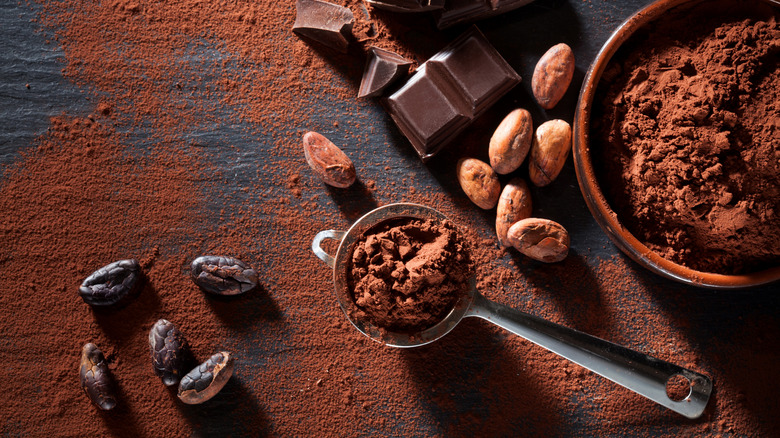The Cocoa Shortage Is Worsening, With Major Exporters Facing Default
If there's a more heartbreaking combination of words than "global chocolate shortage," we don't want to hear it. It's hard enough to process the fact that chocolate is getting more and more expensive, cocoa supplies are dwindling, and some experts have even predicted that chocolate could be extinct by 2050. Fears of such a shortage first arose in the early 2010s, and the situation has trended downward ever since. Judging by a recent Reuters report, 2023 could be the toughest year yet for the cocoa trade, as it appears that exporters in the world's top cocoa-producing country are headed for financial disaster.
It's difficult to think of a plant less equipped to meet a global demand than the cacao tree. It can only grow within 20 degrees of the equator and requires hot temperatures, high humidity, and constant rain. This limits its range to just a handful of countries, which have in turn become heavily reliant on the cocoa industry. Ivory Coast is the world's top cocoa producer, accounting for nearly 40% of the global supply, while the cocoa business accounts for 15% of the West African nation's GDP.
It's an incredibly high-stakes industry, and it's in trouble. In February, Ivory Coast's national cocoa regulating body, the Cocoa and Coffee Council, met with representatives of domestic and international traders to discuss a very concerning possibility: that a host of multinational exporters could default on their contracts.
Causes of the cocoa shortage
The Ivory Coast cocoa crisis shows the consequences of dwindling supply meeting growing demand. There is a shortage of cocoa beans, and like other food shortages in 2023, climate change is a key contributor.
Cacao can only grow in very specific environmental conditions. There's not much room for error, which makes it especially vulnerable to climate change. In 2016, The National Oceanic and Atmospheric Administration predicted that West Africa would see temperatures climb 3.8 degrees Fahrenheit by 2050. As Ivory Coast gets hotter, its soil and plants will dry out, and there isn't enough rain projected to make up for this. As much as 89.5% of cacao-growing land in Ivory Coast and Ghana could be unsuitable by 2050.
Complicating matters is our ever-increasing demand for chocolate. In the past decade, the market has grown substantially, thanks to rising cocoa consumption in China. In the United States, chocolate outsells all other forms of candy twofold. We're not just demanding more chocolate; we're demanding purer chocolate, which uses more cocoa. Once-popular milk and white chocolates have fallen further out of favor as chefs tout a 70% cocoa standard. A growing number of studies showcasing the health benefits of dark chocolate go as far as to suggest we eat some every day. As much as we'd like to, it might not be possible. We've begun treating a luxury item like an everyday commodity, and it doesn't appear sustainable.
Consequences for exporters
The chocolate deficit poses a particularly big problem to domestic exporters, as Ivory Coast's October-March harvest period has come up far short of expectations. The country sells export contracts through the CCC, which are valued by the tonne. As of February 13, exporters still needed 150 million tonnes of cacao beans to fulfill their contracts. They seem unlikely to get enough in time, which could lead some exporters to default on their contracts.
At the behest of lobbyists, the CCC met with representatives for domestic exporters and traders, proposing solutions that met with little enthusiasm. One suggestion was to push back the contract loading period until June, but traders expressed doubt that this would work considering the desirable harvest period ends in March.
Another proposal would limit the number of days that cocoa grinding companies could hold onto beans, but grinders have argued this will keep them from meeting demands. It seems there's no easy solution to the cocoa problem, and Ivory Coast will likely be a bellwether for the rest of the chocolate industry. As we await our confectionary fate, it might be wise to pick a savory snack.


